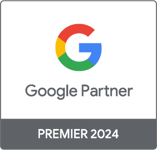Welcome to SmartBug!
Looking for Chair 10 Marketing? You've found the right place! As you know, SmartBug Media® acquired Chair 10 Marketing in May 2023. We wanted to share more details about what you can expect in the future. (Spoiler alert: same team, same expertise!) We're excited to welcome you to our award-winning team and look forward to delivering exceptional results in paid media and throughout the entire customer lifecycle.
A Message from SmartBug's Global CEO
Welcome to the SmartBug family! We're so excited you're here.
In 2007, SmartBug® was founded on the notion that marketing agencies should be built by marketers for marketers. Since then, thanks to our remote-first culture, we've recruited the best and brightest digital marketing professionals worldwide to deliver exceptional results to our customers. Over the last 17 years, we've grown our team to nearly 300 award-winning subject matter experts from Montreal to Mexico City, New York to Nashville, Seattle to San Diego, and everywhere in between.
As we've expanded our reach, SmartBug's commitment to you, our customers, remains steadfast. Our core values keep us accountable to you and to one another. Get It Done. Stay Curious. Have Fun. Innovate, Always. Rock It. Bend, Don't Break. Build Belonging. These foundational values have always set us apart from the rest, and they grow stronger every time we rock it for you, our newest SmartBug clients.
So, what can you expect moving forward? More of what you love the most.
- Same expertise. Thanks to the acquisition, we've brought together the best minds in paid media. SmartBug will continue to bring you the same level of paid media expertise you've come to expect, and you'll continue to work with the teams you know and trust. From audience segmentation to strategic conversion tracking, we've honed proven processes to monitor the success of every pay-per-click campaign, including for multilocation clientele. Learn more about our strategy for paid media success.
- Same technical savvy. We're versed in today's leading paid media platforms, so we can work collaboratively to fortify your brand's authority. We'll continue to leverage Google ads, Facebook and Instagram ads, LinkedIn ads, YouTube ads, Google Local Services ads, and more to get the word out.
- Same dedication to incomparable results. We'll help you reach your goals faster and develop a winning strategy for sustained success. As we've grown, we've curated a diverse portfolio of B2B and B2C clientele encompassing higher education, healthcare, franchise networks, financial services, professional services, software and technology, and other verticals. Check out SmartBug's achievements for one of our largest clients in the senior living space.
Plus, now that you're part of the SmartBug family, you'll gain access to:
- Industry excellence. Over the years, we've won more than 200 awards for outstanding client outcomes. We're proud recipients of 15 HubSpot Impact Awards, including two Happiest Customer Awards and the HubSpot 2022 Impact Award. In 2023, SmartBug was named to the prestigious Inc. 5000 list of the fastest-growing private companies in America for the seventh year in a row. Additionally, in 2023, SmartBug was ranked No. 140 on Inc. magazine’s List of the Pacific Region’s Fastest-Growing Private Companies.
- 360-degree approach to the customer lifecycle. We're here to support your customers throughout the entire lifecycle with comprehensive solutions for sales, revenue operations, marketing, customer success, payments and e-commerce, and web content management. Explore all of our solutions to learn more about the options available to you in conjunction with your paid media efforts.
Rest assured—you're in good hands. As we enter this new and exciting next phase of SmartBug's evolution, we would like to extend a warm welcome to our newest clients and look forward to a bright future together in the paid media space and beyond.
Thank you for your continued partnership. And again, welcome to the SmartBug family!
Ryan Malone
Global CEO

Google Premier Partner
Most Decorated HubSpot Elite Partner

Klaviyo Master Elite Partner
Paid Media & Other Partners











Welcome to Full Service Digital
When you're working with a team of seasoned professionals, you don't have to choose between one service or another. We're here for all of our clients throughout the entire customer lifecycle.
Tap to read about SmartBug's SMEs
Marketing
It’s about creating a growing marketing funnel. You get there by connecting with a full service digital agency that not only provides demand generation built on inbound principles, but also maximizes paid media, web development, public relations, top-tier creative, and more.
Sales
Find and qualify leads faster—and close quicker. We have the teams and the tools to make selling smarter by reaching your most likely customers and giving them what they need throughout the entire buyer’s journey.
Revenue Operations
Generate more revenue from your sales and marketing—and propel those deals with seamless automation, in-depth reporting, smart segmentation, and the right analytics. Plus, get the tools and expertise you need for subscriptions, billing, and payments.
Web CMS
Let’s make sure your website does the heavy lifting. We’ll migrate existing content to your content management system (CMS) of choice—HubSpot, WordPress, or Shopify—and transform your online presence with visuals, functionality, and content strategically crafted for lead generation.
Customer Success
From ticketing automation and customer service automation to self-service portals, knowledge bases, and beyond, we keep you connected and help you support your customers with the tools, tech integration, and migrations that are right for your operations.
Payments & E-Commerce
E-commerce moves fast—especially during holidays. Our team keeps up with increasing demand through our well-proven email, SMS, and Shopify strategies designed to accelerate your business growth and boost ROI.
Popular Resources
Browse All Resources
Navigating Digital Transformation in Franchise Marketing
Learn strategies for successful franchise marketing in a digital-first world.
Read More
Outperform Your Competitors: Your Playbook for Ad Copy Optimization with AI
Want to save 30-50% of your time on ad copy optimization? (And that’s just where the benefits start.) Read this guide on ad copy optimization with AI!
Read More
The Vital Role of a Paid Search Strategy in Digital Marketing
Paid search plays an essential role in marketing. Learn how paying using ads on can help increase website traffic, visibility, and conversions.
Read More